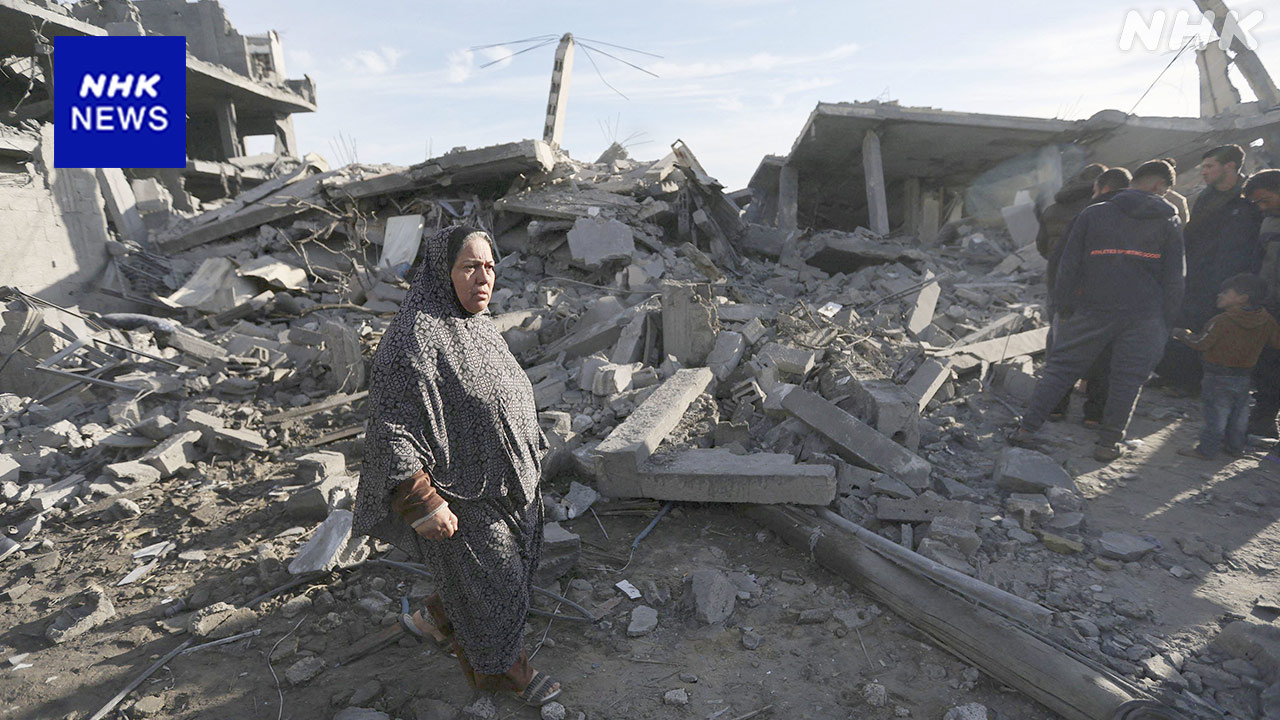The Israeli military is preparing to carry out ground operations in Rafah, the southernmost part of the Gaza Strip, and continues to carry out heavy airstrikes on the 13th.
Meanwhile, Israel is reported to have held talks with mediator Qatar and other parties regarding a cessation of fighting and the release of hostages, and the focus is on whether the negotiations will lead to progress.
On the 13th, the Israeli military, which continues its military operations against the Islamic organization Hamas, announced that it had killed more than 30 Hamas fighters in the southern city of Khan Yunis.
The Israeli military is preparing to conduct a ground operation in Rafah, the southernmost part of the Gaza Strip, as it is believed to be the last stronghold of Hamas, but there are concerns from the international community about the ground operation, as more than 1 million people are sheltering in Rafah. is increasing.
Under these circumstances, the Israeli military continued to carry out airstrikes on Rafah, and on the 13th, the Middle East satellite television station Al Jazeera reported that a reporter and cameraman were seriously injured in an attack by the Israeli military in Rafah.
Gaza health authorities said on the 13th that 133 people had died in the past 24 hours across the entire Gaza Strip, bringing the total number of deaths to 28,473.
Meanwhile, regarding the cessation of fighting and the release of hostages, multiple Israeli media outlets reported on the 13th that Israel had discussed a plan to suspend fighting for six weeks in the Egyptian capital, Cairo, with Qatar and other mediators.
Regarding the negotiations, Hamas had proposed a four-and-a-half-month hiatus from fighting and a cease-fire in conjunction with the release of the hostages, but Israel had shown its refusal to do so.
As Israel appears poised to carry out a ground operation against Rafah, the focus is on whether the talks in Egypt will lead to progress in negotiations.
WHO: “Health care system is collapsing”
As the Israeli military prepares to carry out a ground operation in Rafah, the southernmost part of the Gaza Strip, the regional director of the World Health Organization (WHO), which has jurisdiction over the region, posted on his social media on the 12th that many people were in hospitals. I posted a photo of them getting together.
In the post, he once again appealed for a ceasefire, saying, ``Rafah's hospital is at its limit.The number of patients exceeds the number of beds available.Medical workers continue to endure with their hands full.''
On the 13th, WHO also posted on social media the situation at another hospital in the southern Gaza Strip.
A United Nations official who visited the hospital said, ``The medical system is collapsing,'' and said there was no medicine to relieve the pain of a 7-year-old girl with burns on 75% of her body. He spoke of the dire situation, such as the lack of even basic supplies to keep floors clean, and appealed for the need to bring in supplies.
It is said that more than 20,000 people have taken shelter at the hospital, and footage shows children sitting on beds without mattresses, and children sleeping or sitting on mattresses or cots placed in what appears to be hallways and halls. There are also people who do this.
He added: "More than 200 patients are unable to be discharged from hospital because they have nowhere to go to safety."
Regarding hospitals in the Gaza Strip, WHO Director-General Tedros Adhanom Ghebreyesus acknowledged on the 12th that 15 of the 36 hospitals in the Gaza Strip are only partially functioning and that sufficient medical supplies are not reaching the area. The medical situation is worsening.
Doctor in Rafah: ``The pain of living every second I hope it ends soon''
On the 13th, Médecins Sans Frontières posted on social media a story about a doctor in Rafah, the southernmost part of the Gaza Strip, which is under heavy attack by the Israeli military.
According to the post, the attack occurred at 5 a.m. on the 12th, right near where the doctor and his family were.
The doctor said, ``We wrote our names on the wrists and feet of our children and families so that if we were bombed or our place was destroyed, we would know who we were. It may be meaningless,'' he says, expressing his feelings about being exposed to intense attacks.
And I said, ``I survived, but in my heart I don't. We will all die. I hope this suffering of living every second ends soon. I cry every night. Day by day, things get tougher.'' "It's just that," he says, expressing his plight.
Israeli military chief: ``We still have a long way to go to achieve the war objectives''
The Israeli military released a video on the 13th showing that the top military official, Chief of Staff General Halevi, visited the border area between the Gaza Strip and Israel.
In this, Chief of Staff Halevi said of the southern Khan Yunis, ``We have reached places that Hamas never imagined they would reach.To date, we have eliminated more than 10,000 terrorists, including many commanders.'' ” he emphasized.
"We still have a long way to go to achieve the objectives of the war. If we don't continue to attack Hamas, it will be very difficult to take back the hostages and end the war. We don't have a plan. "There is. We will choose the appropriate time and method to carry it out," he said, indicating his intention to continue military operations in various locations.

